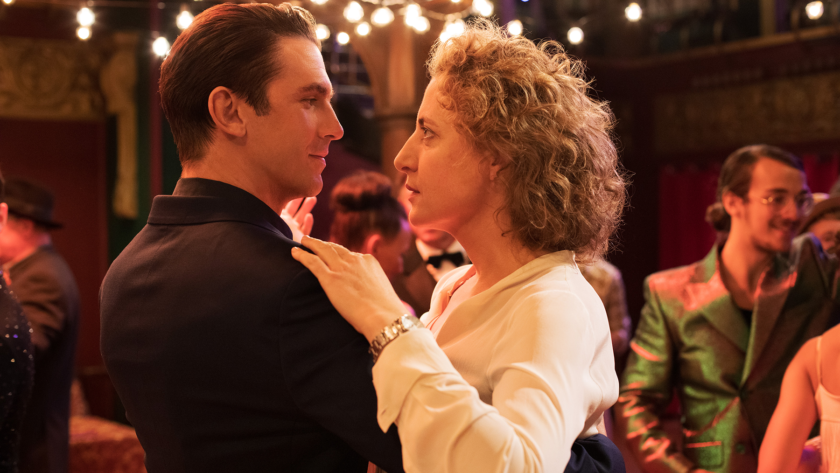Editor-in-chief Tomi Haffety reviews a Berlinale award winner about the complexities of AI relationships.
After Maria Schrader’s miniseries Unorthodox, released during the UK lockdown of summer 2020, set a new standard for quality television, her competition entry I’m Your Man drew much attention at Berlinale. Touching on themes of self-identity and human connection, this feature offers a comedic glimpse into the possibilities of artificial intelligence.
Alma (Maren Eggert, who won the Golden Bear award for best actor) is an anthropologist taking part in a three-week trial to test living with a humanoid robot who is programmed to be her ideal partner. Sceptical about relationships, having an awkward friendship with her ex and frustrated with the pressure for women to be coupled up, Alma is understandably bewildered as she is introduced to Tom (Dan Stevens, speaking fluent German), her personal robot. Looking as human as you and I, nothing would give Tom away if it wasn’t for his sinister piercing blue eyes and slightly mechanical movements. In order to test her curiosity about how ‘real’ Tom is, Alma asks him a series of complex questions inciting profound responses about the meaning of life and quotes from romantic poetry. The aim of the trial is the eventual evaluation that all testers must submit after the three-week period, which will analyse whether the robots should be given the same rights as German citizens. From the onset, this film poses the paramount question of what really makes us human; this theme persists throughout the 100-minute feature, as Alma struggles to differentiate herself from the holograms and robots that surround her.

Tom is introduced as a rigid and blunt character, who knows everything about Alma down to the smallest detail of her desires. But throughout the film, I became more attached to him than to any other character. Offering dry humour and often witty remarks as he attempts to assimilate into human society, he makes it easy for one to forget that he is nothing more than a vessel for a computed algorithm. While trying his utmost to make Alma happy, he is met with resistance and scepticism as she refuses to let herself treat him like a human, as she has been instructed to do in order to create an accurate simulation of human relationships. With periodic lines that strike a symbolic chord, Tom’s handler (Sandra Hüller) acts as the relationship mediator between robot and human, expressing the importance of a shared past between the two. ‘You can’t have a future without a past’, she says, her indifferent tone making the statement even more poignant as it poses the recurrent questions of morals surrounding AI and future human development.
Amongst all the impressive attributes that make this film an enjoyably easy watch, the soundtrack stood out as a striking addition to its atmosphere. The melodic meditativeness of Bremer/McCoy’s deep ambient music used in transitions and over shots of Berlin infused with natural light creates a deep appreciation for all things human. Alma begins to become liberated by Tom’s presence and transitions from treating him like a machine to treating him like a man. The evolution of their relationship incites us to view AI in a somewhat romantic and comedic light. The pivotal scene comes in a scene of intimacy in which the true boundaries of AI are tested, and the question of how well a humanoid robot can replace human physical touch and connection is answered.

I’m Your Man explores deep questions about human connection, the nature of relationships, and whether or not AI has a place in our future. But the plot itself is slow-moving and lacks a climactic arch, never reaching a conclusion and leaving many questions unanswered. I was left with no residual emotions toward the film, and though it does try hard to develop sceptical rhetoric about the development of AI, the eventual ending comes after a drawn-out realisation that has been concluded many times before by the likes of Black Mirror and Her. While writing her evaluation, Alma stresses the importance of the ‘human’ in relationships. It is impossible to force a perfect relationship, and the irritation and conflict involved are all essential parts of our desire to be accepted for all our flaws as well as our beauty.




